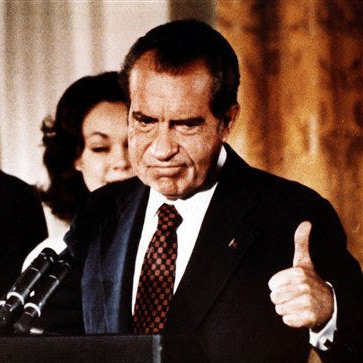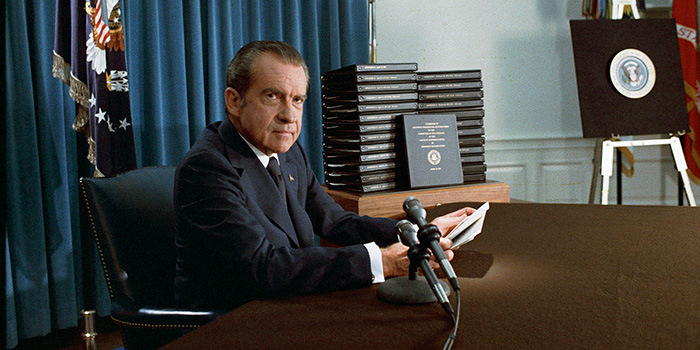Quiz Topic Sheet
Retrospective 1974
1974 was a year of political and economic upheaval, reflecting the tensions and aspirations of an era in the throes of change.
It was the year in which Richard Nixon, President of the United States, resigned in the wake of the Watergate scandal, and during which the world economy was severely impacted by the energy crisis following the 1973 oil crisis, leading to inflation and recession in many countries.
Advertisement
Politics
- In April 1974, a peaceful revolution overthrew the authoritarian regime led by Marcelo Caetano, putting an end to almost 50 years of dictatorship. This revolution, known as the Carnation Revolution, led to the establishment of a democratic regime in Portugal.
- In May 1974, Valéry Giscard d'Estaing won the presidential election in France, becoming President of the French Republic. His election marked the start of a period of political and economic modernization in France, known as "Giscardism".
- In July 1974, the military regime in Greece, Regime of the Colonels, which had been in power since 1967, collapsed following a major political crisis. This transition marked a return to democracy in Greece and paved the way for significant political reforms in the country.
- In August 1974, U.S. President Richard Nixon resigns in the wake of the Watergate scandal, in which illegal activities by White House staff were revealed. Nixon faced impeachment proceedings, but chose to resign, becoming the first American president to do so.
- Gerald Ford becomes President: following Nixon's resignation, Vice President Gerald Ford becomes the 38th President of the United States. Ford then grants Nixon a presidential pardon to avoid prosecution.
- In October 1974, the Arab League held its summit in Rabat, Morocco, and adopted a resolution recognizing the PLO as the sole legitimate representative of the Palestinian people.
- Prelude to civil war in Angola: the MPLA, FNLA and UNITA clash for control of the country after independence from Portugal.
Economy
- The most significant event with far-reaching repercussions in 1974 was the oil shock of 1973-1974. In October 1973, the member countries of OPEC (Organization of the Petroleum Exporting Countries) decided to cut oil production and raise prices, partly in response to Western support for Israel during the Yom Kippur War. This decision led to a four-fold increase in oil prices, causing major economic disruption in non-oil-producing countries, particularly in Western economies.
- The rapid rise in oil prices contributed to widespread inflation around the world. Many countries experienced double-digit inflation rates. To combat inflation, several central banks raised their interest rates, with the side-effect of slowing economic growth.
- The combination of high inflation and high interest rates led to a global recession in 1974. Western economies, in particular, were hard hit, with significant increases in unemployment and falling industrial production.
- This was the first major recession since the end of the Second World War, and marked the start of a period of economic stagnation known as "stagflation", characterized by low economic growth and high inflation.
Science
- In Ethiopia, the fossil remains of a hominid (Australopithecus afarensis) over three million years old were discovered in 1974. Nicknamed "Lucy", this discovery represents a major milestone in the study of human evolution, providing valuable information about humanity's ancestors.
- NASA's Mariner 10 missions flew over Mercury, transmitting the first close-up images of the planet.
- In May 1974, India conducted its first successful nuclear test in the Rajasthan desert, becoming the sixth nation to possess nuclear weapons. This demonstration of nuclear power gave rise to regional concerns and tensions, particularly with neighboring Pakistan.
Sport
- West Germany wins the 1974 FIFA World Cup, beating the Netherlands in the final. The tournament is played mainly in West Germany, and is marked by the growing rivalry between the German and Dutch teams.
- In October 1974, the famous "Rumble in the Jungle" boxing match took place in Kinshasa, Zaire (now the Democratic Republic of Congo). World heavyweight champion George Foreman faced Muhammad Ali in a historic match, in which Ali won by KO. The fight remains one of the most famous events in boxing history.
- The 61st edition of the Tour de France takes place in July 1974. The cycling event saw the victory of Belgian rider Eddy Merckx. This was his fifth Tour de France victory.
- The 1974 Formula 1 season saw Brazilian driver Emerson Fittipaldi win his second world championship title at the wheel of a McLaren car. Fittipaldi became the first driver to win a world championship with McLaren.
- The Miami Dolphins won the Super Bowl on January 13, 1974, beating the Minnesota Vikings, 24-7.
- The Oakland Athletics won the World Series by beating the Los Angeles Dodgers, 4 games to 1.
- The Boston Celtics won the NBA championship by beating the Milwaukee Bucks, 4 games to 3.
- The Philadelphia Flyers won the Stanley Cup by beating the Boston Bruins, 4 games to 2, becoming the first team from the 1967 expansion to win the trophy.
- The 1974 European Champion Clubs' Cup saw Bayern Munich defeat Atlético de Madrid.
- Ireland won the Five Nations Tournament, sharing the title with Wales.
Music
- Progressive rock was at its peak with bands like Pink Floyd, who released "The Dark Side of the Moon" in 1973, but whose popularity continued to grow in 1974, staying in the charts for a record length of time. Yes and Genesis were also major players on the scene, experimenting with complex musical structures and album concepts.
- Glam rock continued to shine, with artists like David Bowie, who released "Diamond Dogs" in 1974, and T. Rex. It was also a period when punk was beginning to emerge in reaction to the complexity of progressive rock and the spectacle of glam rock, with bands like The Ramones formed in 1974, although their impact would not be felt until a little later.
- Disco was beginning to gain in popularity, with hits like George McCrae's "Rock Your Baby" and Carl Douglas's "Kung Fu Fighting". These tracks heralded the arrival of an era when dance and rhythm would prevail in the global charts.
- The soul, funk and R&B genre was represented by artists such as Stevie Wonder, who released "Fulfillingness' First Finale", and Marvin Gaye with his groundbreaking album "Let's Get It On" released the previous year, but whose singles continued to dominate the charts. Funk saw significant contributions from Parliament-Funkadelic, led by George Clinton.
- Country music saw artists like Dolly Parton and John Denver become increasingly popular, with Denver releasing his hit "Annie's Song" in 1974. Country-rock music was also gaining in popularity, thanks to artists like The Eagles.
- Internationally, popular music continued to flourish in a variety of genres and languages, with artists such as ABBA, who won the 1974 Eurovision Song Contest with "Waterloo", marking the start of their domination of world pop.
Movies
- The Godfather Part II: Directed by Francis Ford Coppola, this film is often cited as one of the best films of all time. The sequel to "The Godfather", this second installment continues to tell the story of the Corleone family, exploring the origins and rise of Vito Corleone and Michael Corleone's reign as godfather. The film won several Oscars, including Best Picture.
- Chinatown: Directed by Roman Polanski, "Chinatown" is a film noir starring Jack Nicholson and Faye Dunaway. The story follows a Los Angeles private detective who finds himself entangled in a complex web of lies, corruption and murder. The film is famous for its complex plot and memorable ending.
- The Towering Inferno: This disaster movie directed by John Guillermin tells the story of a gigantic fire that breaks out in the world's tallest skyscraper on its opening night. The film stars Steve McQueen and Paul Newman, and was noted for its impressive special effects.
- Blazing Saddles: The western comedy directed by Mel Brooks is famous for its satire of American western clichés and racism. The film is known for its daring humor and parodies.
- Lenny: The biopic directed by Bob Fosse, starring Dustin Hoffman as Lenny Bruce, a controversial comedian of the 1960s. The film explores Bruce's life and career, as well as his run-ins with the law due to his provocative humor.
- Young Frankenstein: Another Mel Brooks comedy, "Young Frankenstein" is an affectionate parody of classic 1930s Universal horror films. With Gene Wilder in the lead role, the film is a hilarious comedy that plays with the tropes of the genre in inventive ways.
- Murder on the Orient Express: Directed by Sidney Lumet, this film is an adaptation of Agatha Christie's novel. With a star-studded cast including Albert Finney, Lauren Bacall and Ingrid Bergman, the film follows detective Hercule Poirot as he attempts to solve a murder on the luxury train.
Other events
- Stephen King publishes his first novel, "Carrie", which quickly becomes a bestseller. This horror novel marks the beginning of King's prolific career as a fiction writer, and has a profound influence on the horror genre in literature.
- Patty Hearst affair: American heiress Patty Hearst is kidnapped by a left-wing revolutionary group.
- The famine that devastated Bangladesh had disastrous consequences: an estimated 1.5 million people died, mainly children and the elderly, and millions suffered from malnutrition.
- The invention of the Rubik's Cube by Erno Rubik, a Hungarian architecture professor, stimulated interest in mathematics, logic and problem-solving.
- In May 1974, India conducted its first successful nuclear test in the Rajasthan desert, becoming the sixth nation to possess nuclear weapons. This demonstration of nuclear power gave rise to regional concerns and tensions, particularly with neighboring Pakistan.
Births
- Leonardo DiCaprio
- Christian Bale
- Joaquin Phoenix
- James Blunt
- Penélope Cruz
- Amy Adams
Deaths
- Georges Pompidou
- Duke Ellington
- Charles Lindbergh
- Ed Sullivan
Further Information
Advertisement
Quiz questions preview
-
Which neo-noir film directed by Roman Polanski starred Jack Nicholson and Faye Dunaway?
Chinatown | Easy Rider | Bonnie and Clyde | Shining -
This film by Francis Ford Coppola won the Palme d'Or at the Cannes Film Festival in 1974.
(The Godfather: Part II) | The Rain People | Apocalypse Now | The Conversation -
Who was West Germany's Chancellor at the beginning of 1974?
Kurt Georg Kiesinger | Willy Brandt | Helmut Schmidt | Gustav Heinemann -
Singer-songwriter born on February 22, known for his albums "Back to Bedlam" and "All the Lost Souls".
James Blunt | James Arthur | James Morrison | James Blake -
Who succeeded Richard Nixon as President of the United States during 1974?
Spiro Agnew | Jimmy Carter | Gerald Ford | Ronald Reagan


